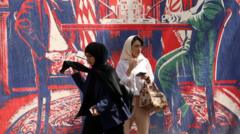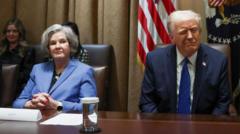A recent United Nations report reveals that Iran has nearly doubled its stockpile of near-bomb-grade uranium, raising concerns about its capability to produce fuel for approximately ten nuclear weapons, even as negotiations with the United States continue.
Iran Accelerates Uranium Enrichment Amid Ongoing Nuclear Discussions

Iran Accelerates Uranium Enrichment Amid Ongoing Nuclear Discussions
Tehran's nuclear advancements complicate diplomatic efforts as uranium stockpile increases significantly.
Iran has made significant strides in its nuclear program over the last three months, doubling its near-bomb-grade uranium stockpile amidst ongoing diplomatic discussions with the Trump administration. A confidential report from the International Atomic Energy Agency (IAEA) indicates Tehran now has the capability to produce bomb-grade fuel for about ten weapons, a notable increase from the five or six estimated at the start of the Trump administration in January.
This rapid enhancement of Iran's nuclear capabilities also intensifies pressure on Washington, which is pushing for Tehran to halt all nuclear material production as part of the negotiation process led by Trump's envoy for the Middle East, Steve Witkoff. While President Trump expressed optimism over reaching a deal soon, no agreement has materialized yet.
The IAEA's director general, Rafael Grossi, emphasized the necessity for a "diplomatic resolution" underscored by a stringent inspection regime. In recent years, Iran has restricted access to numerous IAEA cameras and sensors at crucial nuclear sites. Nevertheless, it has permitted inspectors to gauge its enriched uranium stockpiles.
In a quarterly assessment document obtained by The New York Times, Grossi highlighted, "The significantly increased production and accumulation of highly enriched uranium by Iran, the only non-nuclear-weapon state to produce such material, is of serious concern." The prevailing situation underscores the challenges facing international negotiators as they seek to curb Iran’s advancing nuclear program.
This rapid enhancement of Iran's nuclear capabilities also intensifies pressure on Washington, which is pushing for Tehran to halt all nuclear material production as part of the negotiation process led by Trump's envoy for the Middle East, Steve Witkoff. While President Trump expressed optimism over reaching a deal soon, no agreement has materialized yet.
The IAEA's director general, Rafael Grossi, emphasized the necessity for a "diplomatic resolution" underscored by a stringent inspection regime. In recent years, Iran has restricted access to numerous IAEA cameras and sensors at crucial nuclear sites. Nevertheless, it has permitted inspectors to gauge its enriched uranium stockpiles.
In a quarterly assessment document obtained by The New York Times, Grossi highlighted, "The significantly increased production and accumulation of highly enriched uranium by Iran, the only non-nuclear-weapon state to produce such material, is of serious concern." The prevailing situation underscores the challenges facing international negotiators as they seek to curb Iran’s advancing nuclear program.




















